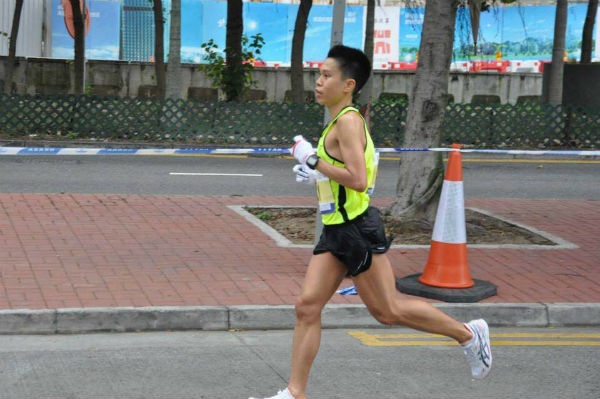27-year-old PE teacher Alex Ong is a regular podium finisher at Sundown Marathon races. In 2012, he won the Full Marathon (men’s category) in 3 hours 3 minutes and 28 seconds. In 2013, Alex came third in the Full Marathon and also finished second in the Sundown Ultra Marathon’s Team of 4 (Mixed Relay).
This year, he is competing in the 42km race again – and would be happy with a time of less than three hours.
I recently interviewed Alex and picked his brains for tips on running in the Sundown Marathon at the end of May. To find out what he said, do read on.
What sort of training have you been doing so far, for this race?
Some long runs, daily easy runs and some hill running. I don’t do speed work so I run on hills. Some of my runs take place at night as I would like to get used to the challenges of running at night.
What sort of terrain have you been mostly training on?
I run mostly on concrete pavements and tarmac. I find it a challenge to find soft surfaces in a concrete city like Singapore. The fields here are pretty much uneven and I don’t want to risk injuring myself by running on them.
Share with us, your weekly cross training programme for the Sundown Marathon.
After some of my runs, I will do some abdominal work such as crunches and planks. If there’s a good football match or movie on TV, I will set up my road bike on my trainer and cycle.
What is your diet like now – with just over a month from your Sundown run?
I enjoy my greens. But other than my excessive love for broccoli and salads, I eat normally. Oh! And I love eating eggs as well. My friends can attest to that.
How important is healthy eating for runners?
It is important to eat well once an individual starts training. Running is a intensive sport and runners need all the nutrients they can get to recover and perform well.
Healthy eating is important, but I think that runners shouldn’t be overly obsessed with it. Just substitute some food choices with healthier alternatives and all’s good.
When should carbo-loading start for Sundown Marathon runners?
Good question! Carbo-loading works differently for different runners. If I were to provide a time-frame for carbo-loading I would say between two to three days before the marathon.
A misconception I find most runners have, is to carbo-load the night before a (morning) race. The body needs time to digest and absorb the carbohydrates. Doing this will only stress your body during the race.
Carbohydrates are the preferred fuel for the human body whether at work or at rest. However, there is a limit to how much carbohydrates our bodies can store. Since running is intensive, runners should carbo-load though, because our body will need all the carbohydrates it can get.
What are examples of good carbohydrates for runners to load up on?
Whole grains such at quinoa, fruits such as bananas, spaghetti and sweet potatoes are some of my personal favourites.
How much carbohydrates should be eaten during the carbo-loading phase?
I hesitate to give a golden ratio as the jury is still out. The debate is still ongoing among researchers. What we do know is that more than 60 per cent of the food that runners should consume during the carbo-loading phrase must come from carbohydrate sources. So you should still have food from the other groups to help the body absorb the carbohydrates.
What would you consider to be the main differences between night races and early morning ones?
Definitely the snooze factor! I think many runners will find that our bodies start to “shut down” after dinner time. So it may be a challenge to get pumped up for night races.
It is also more humid at night so some of us may be drenched in sweat after running at night.
Can you share with us, some tips on how to stay awake during running at night?
Coffee may be a good idea for some of us. Other possible solutions would be to gradually tune your body clock so that it learns to stay awake at night, listening to music as you run and so on.
How can runners prevent injuries?
Runners should listen to their bodies and modify their training according to how they feel. Don’t be obsessed with clocking in mileage. Quality over quantity should be emphasized in training.
Any tips you have for those who are doing their first Full Marathon at Sundown Marathon this year?
Firstly, it is important to pace yourselves. The marathon only starts from the 30-32km mark.
Next, do some of your runs at night to get used to the challenges of running at night.
Click here for race tips from regular Sundown Marathon podium finisher, Ivan Low.
***END***

Other Blog Posts
Click here for Sundown Marathon tips from top runner, Ivan Low.
Click here to read about handcyclists who have overcome the odds.
Click here to find out how to treat running injuries, from a specialist sports physician.
Click here to read about the inspiring story of navy serviceman Jason Chee.





Leave a Comment